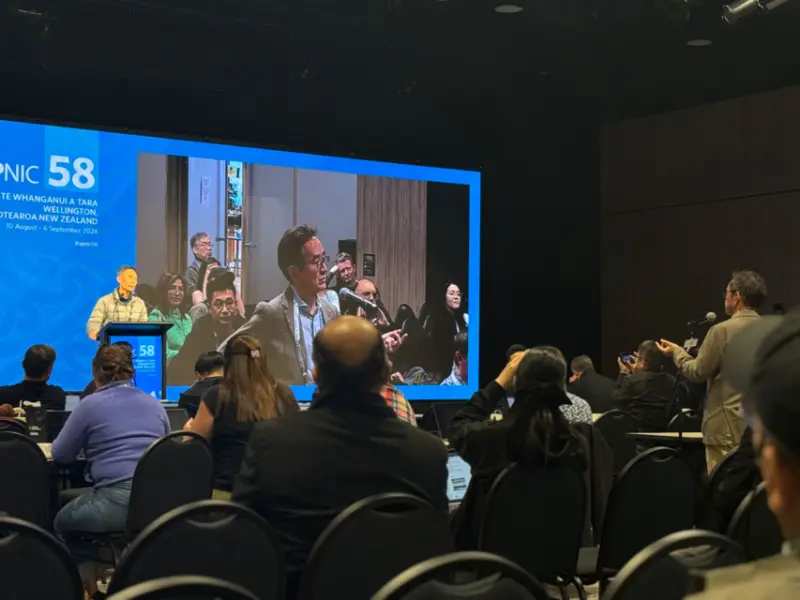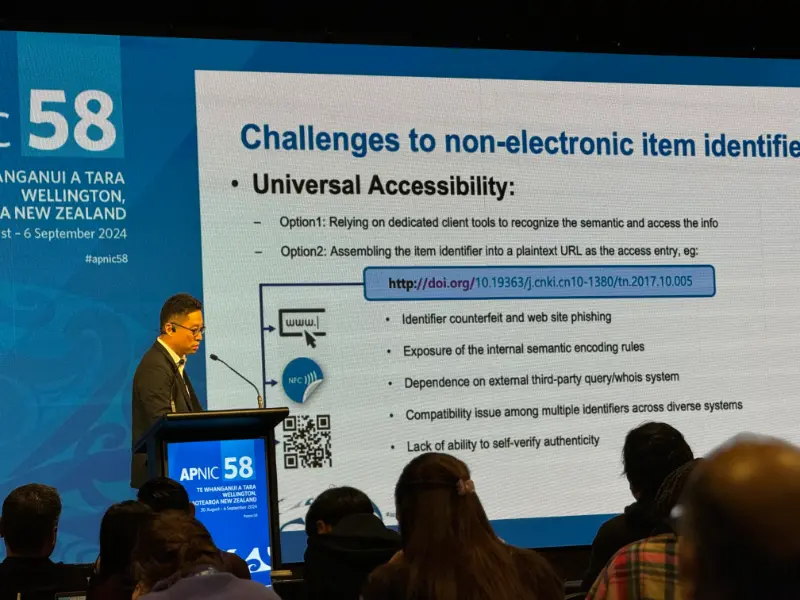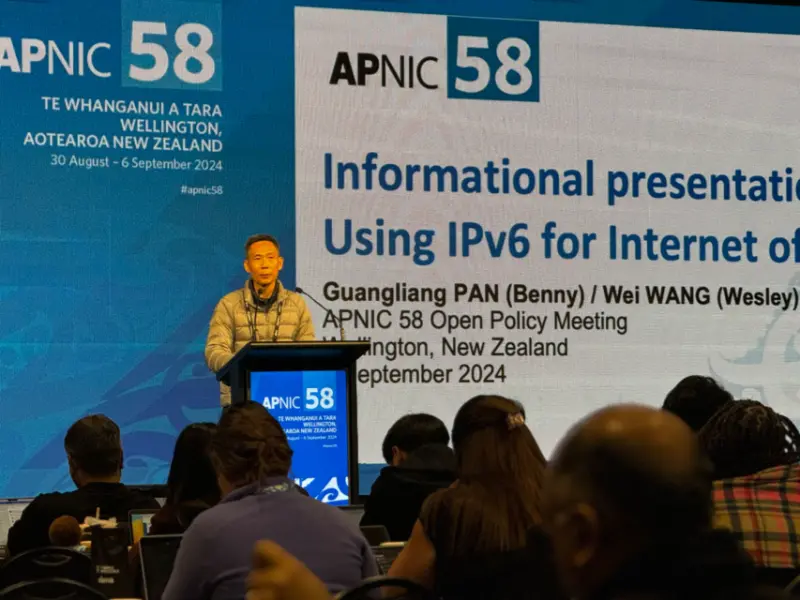- IPv6 enables the assignment of unique addresses to non-electronic items, promoting a true Internet of Everything.
- Benny emphasised IPv6’s role in anti-counterfeiting, ensuring product authenticity through secure identification.
- Wesley addressed challenges of identifier management, including reliance on third-party systems and compatibility issues.
At the recent APNIC58 conference, two speakers, Guangliang PAN (Benny) and Wei WANG (Wesley), presented on the future of IPv6 and its implications for connecting non-electronic items to the internet. The discussion revolved around the concept of the “Internet of Everything,” where both electronic and non-electronic devices are identified and accessible online through unique IPv6 addresses. Both speakers highlighted opportunities and challenges in using IPv6 to create a fully interconnected world.
Also read: APNIC58 closing ceremony: A summary
IPv6 and the internet of everything
In his presentation, Guangliang PAN (Benny) delved into the role of IPv6 in creating an interconnected world where electronic and non-electronic items can be identified through unique internet addresses. The concept, often referred to as the “Internet of Everything,” hinges on assigning a single IPv6 address to each device or product, allowing for direct communication and information hosting. Benny pointed out that current policies allow for the use of IPv6 addresses in this manner, eliminating the need for policy changes.
Also read: What is IPv6 and what are its features?

By assigning unique IPv6 addresses to products, manufacturers can store specific information about an item online, accessible to customers via the internet. This process opens doors for new opportunities in logistics, retail, and anti-counterfeiting. IPv6 addresses can also be mapped to non-electronic items, such as physical goods, making it easier for customers to verify the authenticity of a product. Benny stressed that this system could combat the growing issue of counterfeit goods, as IPv6 addresses, registered with a Regional Internet Registry (RIR), can be tied directly to the product’s manufacturer.
One of the key advantages of IPv6 is its massive address space, making it nearly impossible for counterfeiters to predict or duplicate the IPv6 addresses associated with legitimate products. This adds an extra layer of security in the fight against product fraud, offering both manufacturers and consumers a reliable method to ensure authenticity. However, while the potential for IPv6 in the Internet of Everything is vast, its implementation across industries will require cooperation between stakeholders to ensure its success.
Anti-counterfeiting through secure IPv6 identification
Benny highlighted a crucial benefit of using IPv6 addresses in combating counterfeit goods. By leveraging RIR Whois databases and secure routing technologies, manufacturers can ensure that each product has a unique IPv6 address directly linked to its origin. This level of traceability provides consumers with confidence that the product they are purchasing is genuine.
The scalability of IPv6 further bolsters its application in product authentication. Unlike IPv4, where limited address space leads to shared or recycled addresses, IPv6 offers enough unique addresses to assign to individual items. This means that counterfeiters cannot easily mimic the identity of legitimate products. Benny explained that this is particularly important for industries like luxury goods, pharmaceuticals, and electronics, where counterfeiting poses a significant threat to brand integrity and consumer safety.
Furthermore, the decentralised nature of IPv6 ensures that no single entity controls the addressing system, making it harder for malicious actors to manipulate or interfere with the identification process. Benny’s talk painted a future where IPv6 could serve as a powerful tool in the global effort to reduce counterfeiting, streamline supply chains, and offer greater transparency in product origins. However, challenges remain, particularly in terms of widespread adoption and the development of universal standards for IPv6-based product identification.
Challenges in managing non-electronic identifiers
Wei WANG (Wesley) followed Benny’s presentation by discussing the practical challenges associated with managing non-electronic item identifiers. He pointed out that while IPv6 offers great potential, significant hurdles remain in terms of universal accessibility, counterfeit prevention, and identifier management. One of the key issues, Wesley noted, is the reliance on external third-party systems for querying and verifying item identifiers, which limits manufacturers’ control over the process.

Enterprises frequently manage multiple identifiers across various systems, which can create compatibility issues. Wesley highlighted the problem of depending on external systems such as WHOIS and Handle, where companies lack full control over the query flow. This dependency can expose the internal encoding rules of item identifiers, leading to vulnerabilities in the system. Phishing and counterfeit identifiers can also emerge as a significant risk when relying on third-party verification, creating additional barriers to securing products and data.
Additionally, Wesley pointed out the need for compliance with government regulations, which often require enterprises to manage and report multiple identifiers across different regulatory frameworks. These challenges make it difficult for businesses to implement a self-verification system to ensure the authenticity of item identifiers. Wesley emphasised the need for a unified approach to managing item identifiers, reducing reliance on third-party systems, and developing internal verification mechanisms to ensure that enterprises can maintain control and ensure the integrity of their products.
Also read: Pacific forum highlights digital governance and island resilience

